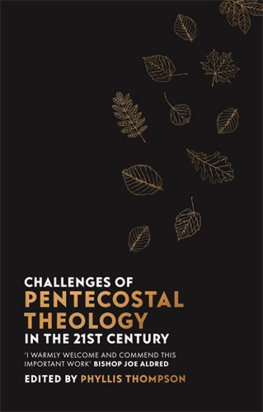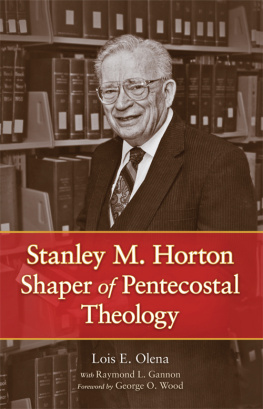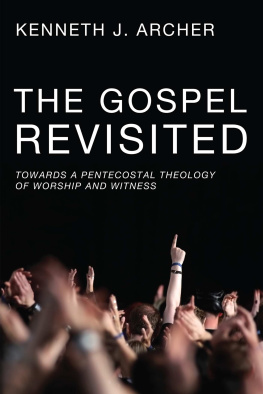David S. Norris - I AM: A Oneness Pentecostal Theology
Here you can read online David S. Norris - I AM: A Oneness Pentecostal Theology full text of the book (entire story) in english for free. Download pdf and epub, get meaning, cover and reviews about this ebook. year: 2013, publisher: Word Aflame Press, genre: Religion. Description of the work, (preface) as well as reviews are available. Best literature library LitArk.com created for fans of good reading and offers a wide selection of genres:
Romance novel
Science fiction
Adventure
Detective
Science
History
Home and family
Prose
Art
Politics
Computer
Non-fiction
Religion
Business
Children
Humor
Choose a favorite category and find really read worthwhile books. Enjoy immersion in the world of imagination, feel the emotions of the characters or learn something new for yourself, make an fascinating discovery.

- Book:I AM: A Oneness Pentecostal Theology
- Author:
- Publisher:Word Aflame Press
- Genre:
- Year:2013
- Rating:3 / 5
- Favourites:Add to favourites
- Your mark:
- 60
- 1
- 2
- 3
- 4
- 5
I AM: A Oneness Pentecostal Theology: summary, description and annotation
We offer to read an annotation, description, summary or preface (depends on what the author of the book "I AM: A Oneness Pentecostal Theology" wrote himself). If you haven't found the necessary information about the book — write in the comments, we will try to find it.
I AM: A Oneness Pentecostal Theology — read online for free the complete book (whole text) full work
Below is the text of the book, divided by pages. System saving the place of the last page read, allows you to conveniently read the book "I AM: A Oneness Pentecostal Theology" online for free, without having to search again every time where you left off. Put a bookmark, and you can go to the page where you finished reading at any time.
Font size:
Interval:
Bookmark:
I
AM
A Oneness Pentecostal Theology
I
AM
A Oneness Pentecostal Theology
David S. Norris, PhD
I AM
A Oneness Pentecostal Theology
by David S. Norris, PhD
Cover Design by Laura Jurek
2009 David S. Norris
Hazelwood, MO 63042-2299
Printing History: 2009
Unless otherwise indicated, all Old Testament passages are taken from the New Jerusalem Bible (NJB) and all New Testament passages from NKJV.
All rights reserved. No portion of this publication may be reproduced, stored in an electronic system, or transmitted in any form or by any means, electronic, mechanical, photocopy, recording, or otherwise, without the prior permission of Word Aflame Press. Brief quotations may be used in literary reviews.
Printed in United States of America

Library of Congress Cataloging-in-Publication Data
Norris, David S., 1954-
I am : a oneness Pentecostal theology / by David S. Norris.
p. cm.
Includes bibliographical references.
ISBN 978-1-56722-730-7
1. Oneness doctrine (Pentecostalism) 2. Trinity--History of doctrines--20th century. 3. Oneness Pentecostal churches--Doctrines. I. Title.
| BX8763.N67 2009 | |
| 230.994--dc22 | 2009007453 |
Table of Contents


Special thanks to Word Aflame Press and Robin Johnston who encouraged me to trim this text from being a Oneness Pentecostal theology (where I give my opinion about everything) to a Oneness Pentecostal christology (where I just give my opinion about Jesus Christ). While this tome might still be big enough to be utilized as a doorstop, the book is better for condensing it.
Thanks to the United Pentecostal Church International for allowing me to teach at Urshan Graduate School of Theology; thanks as well to my students who have put up with the varying and amorphous versions of this text. Although I am indebted to suggestions from colleagues, students, and others, any historical, biblical, or theological errors are strictly my own.
I am very appreciative for the leadership of UGSTs president, David Bernard. I have been enriched by both his formal lectures and by informal discussion related to the systematic theology class where we team teach. My understanding of God is very much influenced by my grandfather, S. G. Norris. My understanding of the man Christ Jesus has been informed by studying under Robert Sabin. Numerous seminary and graduate school professors have all left their mark on me. It will very quickly be apparent to the reader which academics and christologians I tend to read and follow.


I n the last decade, Oneness Pentecostalism has arguably grown from fifteen to twenty-five million adherents,
The writings of those earliest modern Pentecostals who became Oneness in 1913-1915, those whom academics believe capture the essence of Oneness christology in its formation,
Historically, Oneness Pentecostalism was born out of the same impulse that spawned modern Pentecostalism in the first place. Pentecostals are by birthright restorationists. Thus, when at the beginning of the twentieth century Pentecostals deduced from the Book of Acts that speaking in tongues is the consistent biblical evidence for receiving the baptism of the Holy Spirit, they expected that God would in fact restore this gift to the church. This simple hermeneutic, one insisting that church tradition retreat in the face of the biblical narrativethat Scripture should speak on its own termsis the very milieu out of which Oneness Pentecostalism was born. Consequently, when in the second decade of the twentieth century, a number of Pentecostals exploring the scriptural mode of baptism in the light of the Book of Acts began baptizing in Jesus name, their focus on the name of Jesus caused them to critique the doctrine of the Trinity. Ultimately these same people understood the Father, Son, and Holy Spirit in a way that others deemed unsound or even heretical, for it challenged a christological definition that stood, arguably, for fifteen hundred years.
In the writings of Frank Ewart, G. T. Haywood, and Andrew Urshan, it is readily apparent, at least to an insider, that not only do current Oneness Pentecostals have the same confession as these early Oneness Pentecostals; they argue in a similar way as well. By way of clearing the ground, we offer the following nomenclature for this study. Oneness Pentecostals are sometimes wrongly called modalists by their detractors,a triumphalistic reading of church history, privileging what Oneness Pentecostals believe to be the teaching and praxis of the earliest church. It was the application of this Apostolic hermeneutic by the early Pentecostals that resulted in a proclamation of Jesus Christ that has little in common with christological definitions offered by the Catholic Church of the fourth and fifth centuries.
While simplistic definitions of a Oneness Pentecostal christology generally lead to misunderstandings, a few things should be stated as a preliminary working understanding about Oneness beliefs. Oneness Pentecostalism has commonalties and differences with both Evangelicals and other Pentecostals. For instance, Oneness Pentecostals hold a high view of Scripture, they believe in the virgin birth, the imminent return of Christ, the deity of Jesus, and typically pass other litmus tests conservative Evangelicals as well as Pentecostals generally utilize for assessment. On the other hand, Oneness adherents decry any ontological distinction between persons in a Godhead. They do not ascribe to Unitarian thought, merely stripping Jesus of His divinity. Rather, a Oneness christology teaches that the God of the Old Testament was the Father of Jesus, the very Spirit that overshadowed Mary. Further, while Jesus was absolutely human in every sense, the very life of Jesus is the life of God, the fullness of God in Christ. Additionally, since there is no ontological distinction of persons, Oneness Pentecostals necessarily baptize in Jesus name and see what other Pentecostals believe to be the empowerment of the baptism of the Spirit as really a part of initiation into the covenant relationship. It is these claims that create significant dissonance, which at once labels Oneness adherents as both a subset of the larger Pentecostal and Evangelical community while being at the same time assessed as other-than-orthodox.
But the intent of this book is not merely to offer an apologia for those inside the Oneness movement. Our aim is to provide a cogent study for theologians utilizing a heuristic model to accurately present a Oneness construal. The primary source of theology for early Oneness writers was Scripture. It was Scripture used in a specific way, with a logic that made sense in its historical context. We argue in kind, primarily utilizing Scripture; secondarily, we are in conversation with current theologians, arguing in a way that makes sense in our current context.
In the last twenty-five years, a plethora of new approaches has begun to be utilized in studying the biblical text, such as canonical criticism, deconstructionism, and reader response criticism. From a Pentecostal perspective, canonical criticism has been helpful, as well as certain kinds of narrative criticism that allow for a theological reading of the narrative of Luke-Acts.
Next pageFont size:
Interval:
Bookmark:
Similar books «I AM: A Oneness Pentecostal Theology»
Look at similar books to I AM: A Oneness Pentecostal Theology. We have selected literature similar in name and meaning in the hope of providing readers with more options to find new, interesting, not yet read works.
Discussion, reviews of the book I AM: A Oneness Pentecostal Theology and just readers' own opinions. Leave your comments, write what you think about the work, its meaning or the main characters. Specify what exactly you liked and what you didn't like, and why you think so.




